| Srl | Item |
| 1 |
ID:
150211
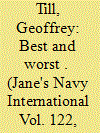

|
|
|
| 2 |
ID:
183162
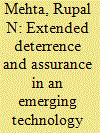

|
|
|
|
|
| Summary/Abstract |
How do emerging technologies impact strategic stability in the international system? I focus on how one aspect of strategic stability, extended deterrence commitments inherent to alliances, may be impacted by the development of new technologies and capabilities. I ask how technological innovations will impact the market deterrence and assurance dynamics in particular. I argue that while technologies may enhance the ability to provide extended deterrence, allies may be less assured by these new capabilities. To test these hypotheses, I explore emerging capabilities in new domains such as drones and hypersonic glide vehicles on international stability.
|
|
|
|
|
|
|
|
|
|
|
|
|
|
|
|
| 3 |
ID:
122775
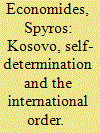

|
|
|
|
|
| Publication |
2013.
|
| Summary/Abstract |
Yugoslavia's wars provide a rich example of the range of challenges posed to international stability and fundamental principles of international relations since 1989. Within this context, Kosovo's independence has now become a cause celebre of the use of the principle of self-determination in state-creation. In addition, the case of Kosovo is an important development in the practice of humanitarian intervention and by implication the evolution of the concept of the Responsibility to Protect. To better understand the effects of Kosovar claims to self-determination on international order, a clearer understanding is required of the factors shaping that order and how self-determination (as it emerges from the road to Kosovo's independence) relates to those factors. The issue of 'self-determination after Kosovo', is placed here into both the context of Yugoslavia's collapse and a number of broader key features which could be said to have played a dominant role in shaping international order post-1989.
|
|
|
|
|
|
|
|
|
|
|
|
|
|
|
|
| 4 |
ID:
103890
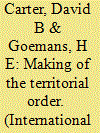

|
|
|
|
|
| Publication |
2011.
|
| Summary/Abstract |
We argue that new international borders are rarely new. We propose that when states choose new borders they use previous administrative frontiers to solve a difficult short-term bargaining problem and a long-term coordination problem. With a unique new set of data collected specifically for this project, we systematically examine the new international borders of the twentieth century resulting from secession, partition, and the use of force. New international borders, we find, are drawn not according to principles of "nationalism" or defensible borders, but rather according to previous administrative frontiers. How borders are drawn has important consequences for international stability: borders drawn along previously existing internal or external administrative frontiers experience fewer future territorial disputes and have a much lower risk of militarized confrontation if a dispute emerges.
|
|
|
|
|
|
|
|
|
|
|
|
|
|
|
|
| 5 |
ID:
120468
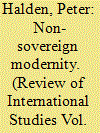

|
|
|
|
|
| Publication |
2013.
|
| Summary/Abstract |
Social theory almost invariably equates modernity with the sovereign state. This equation must be nuanced because the modern era and modern strategies of international stability have contained non-sovereign units. In the nineteenth century, the Great Powers tried to create international stability by engineering forms of rule in Europe. These strategies built on distinctively modern ideas: the possibility of radically breaking with the past, redesigning political organisations, and actively controlling political events through rational planning. Throughout the century the Great Powers alternated between creating non-sovereign units and creating sovereign units as instruments in these stabilising strategies. The degree of trust between the Great Powers accounts for the shift between the two strategies: they tended to create non-sovereign units when mutual trust was high and sovereign ones when trust was low. This article analyses Great Power strategies of designing forms of rule in the Balkans between 1820 and 1878. Like in previous centuries, nineteenth-century Europe actually consisted of two parallel but connected systems: the egalitarian system of sovereign states and a system of non-sovereign entities. Non-sovereign units disappeared only late in the century and this process was affected by the increasing rivalry and mistrust between the sovereign states.
|
|
|
|
|
|
|
|
|
|
|
|
|
|
|
|
| 6 |
ID:
133248
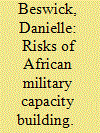

|
|
|
|
|
| Publication |
2014.
|
| Summary/Abstract |
Civil war and insecurity are widely seen as obstacles to development and threats to international stability, and donors are therefore keen to develop African capacities to manage conflict on the continent. Building the capacity of African militaries is hazardous, however, given their frequent roles in coups, support for authoritarian regimes, and violence against civilians. This article argues that the risks of military capacity building can be assessed more accurately by understanding how national governments view and utilize the military as a policy tool. It demonstrates this using the case of post-genocide Rwanda, a significant contributor to African peacekeeping but also to instability in the Democratic Republic of Congo (DRC). The article identifies four features of the Rwandan regime's understanding and use of military force, using these to explain the dual and divisive role of Rwanda's military as an agent of instability on the one hand and peace on the other. Finally, the article explores the M23 crisis, considering implications for donor efforts to manage risks inherent in international commitments to "African solutions". It concludes by arguing that, as African military capacity building continues, recognizing the ways in which such enhanced forces are likely to be used will be crucial to developing a better understanding of the continent's peace and security prospects.
|
|
|
|
|
|
|
|
|
|
|
|
|
|
|
|
| 7 |
ID:
133781


|
|
|
|
|
| Publication |
2014.
|
| Summary/Abstract |
The leading challenge for U.S. grand strategy over the next decade is to exercise persistent global leadership under the shadow of intensifying constraints. These include fiscal shortfalls that limit resources, fading international deference to U.S. wishes, mismatches between the leading security challenges and instruments of power to confront those challenges, and the loss of key military superiorities alongside the appearance of new vulnerabilities. At stake are international stability and the safety of the U.S. homeland. The primary task for U.S. strategists now is to find a sustainable global role more appropriate to available means that can safeguard leading U.S. interests and avoid embroiling more limited U.S. power in secondary issues.
|
|
|
|
|
|
|
|
|
|
|
|
|
|
|
|